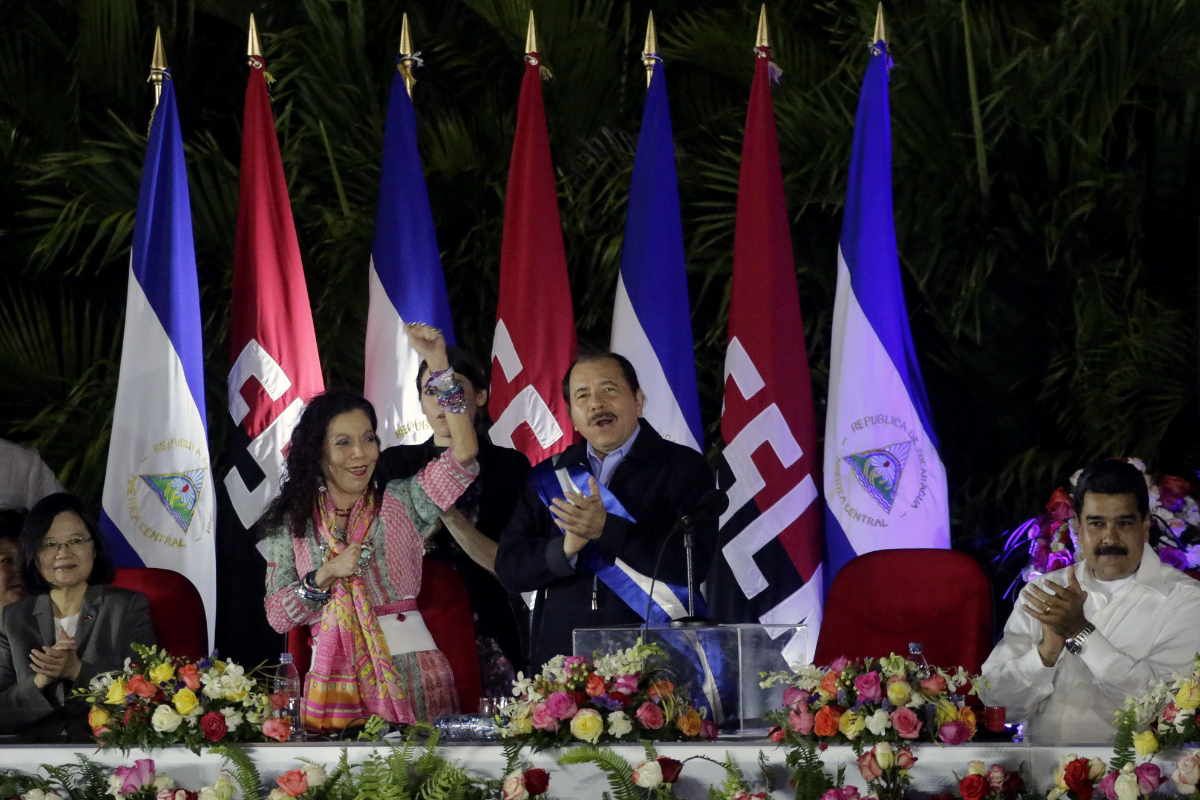

Nicaraguan President Daniel Ortega (2nd R) celebrates with his wife and vice president Rosario Murillo, next to Venezuelan President Nicolás Maduro (R) and the President of Taiwan Tsai Ing-wen (L) in Revolution Square in Managua on January 10, 2017. (Photo by Inti Ocon//AFP/Getty Images)
These apparently disjointed news events are actually quite interconnected, and a reflection of the tug of war going on between an island (Taiwan) and a global power (China) that considers the former a rebel territory to be reunited with the mainland.
In giving money and generous aid programs to cash-strapped nations, both Taiwan and China are trying to wedge influence in the Americas. But although Taiwan is one of Asia’s major economic players, it has become progressively isolated diplomatically due to China’s international pressure on the one-China policy, wherein nations cannot sustain official relations with both China and Taiwan.
China’s animosity towards Taiwan has grown since the Republic of China or ROC (Taiwan’s official name) elected President Tsai Ing-wen from the pro-independence Democratic Progressive Party in 2016, although Ing-wen has said she is committed to keeping the peace and the status quo. China’s design to narrow Taiwan’s diplomatic influence has been there regardless, with Costa Rica becoming the first Central American nation to switch allegiance to the mainland, back in 2007.
A Recount of What This Has Looked Like in the Past Year
In April of 2018, three ships with around 800 crew members from Taiwan’s military arrived to Nicaragua’s shores. Called Taiwan’s “Friendship Flotilla,” the event marked the start of a two to three-month tour of the island’s diplomatic allies, as Beijing increased the pressure to choke off the diplomatic ties of what it considers its renegade province. Taiwan had already lost an influential ally in the region, when Panama decided to switch its diplomatic relations from Taiwan to China in June of 2017, leaving them with formal relations with only 20 countries, more than half of them located in Central America and the Caribbean.
Whether Taiwan considered its “Friendship Flotilla” tour successful or not, it did not get much attention in Western media outlets, but if when considering the facts of what happened later, it must not have been a very pleasant trip. In the following months, the self-ruled island lost its ties to two more nations in the region: the Dominican Republic in late April, and El Salvador at the end of August.
Although the D.R. did not explain or justify its decision originally, a Taiwan official attributed the switched allegiance to a $3.1 billion package of investments and loans “to get them to sever ties with Taiwan,” Reuters reported.
When El Salvador broke ties, the Taiwanese Foreign Minister Joseph Wu criticized both China for its campaign to lure away Taiwan’s allies with promises of great financial aid, and El Salvador for making unreasonable economic demands regarding a port project that the Taiwanese government did not think was feasible. Three months later, the president of the Central American country, Salvador Sánchez Cerén, traveled to Beijing to meet with the President of China, Xi Jinping, and a few days afterward, China announced a $150 million investment in El Salvador channeled toward structure and education projects.
All these shifts in allegiances did not sit well with the U.S. government. Even though it switched its allegiance to mainland China back in 1979 and the U.S. Embassy is located in Beijing, Washington considers Taipei an ally with whom they “enjoy a robust unofficial relationship and close cooperation on a wide range of issues,” according to the U.S. Department of State, and it maintains its unofficial relations through a private, nonprofit corporation called the American Institute in Taiwan, or AIT, which performs citizen and consular services similar to those at diplomatic posts. (Taiwan also holds a representative office in Washington D.C.).
Although the U.S. does not have official ties with Taiwan, it is Taiwan’s second largest trading partner, according to the U.S State Department, and the island was the United States’ eleventh-largest trading partner.
By September, a month after El Salvador’s announcement, the United States withdrew its top diplomats from the D.R., El Salvador and Panama, and denounced the regional governments’ decision to sever ties with Taiwan. Actions such as Ing-wen’s high-profile stopover in the United States in mid-August of last year were a display of the two countries warming up to each other. This irked China, who, in a China Daily editorial, said Washington was trying yet again to intervene in another sovereign nation, “one of Washington’s favorite pastimes.”
“By switching diplomatic ties Dominican Republic, El Salvador and Panama have aligned themselves with the historical truth that there is only one China and Taiwan is an inalienable part of it. This is the consensus of the international community,” said the editorial.
But beyond the tensions between the People’s Republic of China (PRC) and the Republic of China (ROC), and how they play out in Central America and the Caribbean’s diplomatic relationships, a probable cause of concern for these nations who use economic aid as a leverage to grant diplomatic favor is the debt that these developing countries are accruing.
During China’s domestic boom, it financed major projects —more often than not connected to mining, energy and infrastructure— in emerging economies. Kevin P. Gallagher writes in the book The China Triangle, that China provided upward of $119 billion in loans and lines of credit to Latin American governments since 2003.
And in this article published in Project Syndicate, Professor Carmen Reinhart from Harvard warns: “Sometimes connected with graft, hidden debts do not usually appear on balance sheets or in standard databases. Their features morph from one crisis to the next, as do the players involved in their creation. As a result, they often go undetected, until it is too late.”
***
Emily Corona is a digital intern at Futuro Media. She is a journalist and translator from Mexico City, pursuing a master’s in journalism and Latin American and Caribbean studies at NYU. She tweets from @daminijo.


